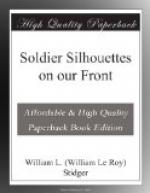“Jesus, Saviour, pilot me
Over life’s tempestuous sea;
Unknown waves before me roll
Hiding rock and treacherous
shoal;
Chart and compass came from Thee;
Jesus, Saviour, pilot me.”
Above the creaking and the vibrations of the great ship, above the beating of the storm, the gunners on the deck below, all unconsciously, in that storm-tossed night were singing the old hymn of their memories, and I think that I never heard that wonderful hymn when it sounded sweeter to me than it did then, as the second verse came sweetly from the lips and hearts of those gunners:
“As a mother stills her child
Thou canst hush the ocean wild;
Boistrous waves obey Thy will
When Thou sayst to them, ‘Be
still.’
Wondrous Sovereign of the sea,
Jesus, Saviour, pilot me.”
We hear a good deal of how our boys sing “Hail! Hail! The Gang’s All Here” and “Where Do We Go From Here, Boys?” as a ship is sinking. I know American soldiers pretty well. I do not know what they sang when the Tuscania went down, but I am glad to add my picture to the other and to say that I for one heard a crowd of American gunners singing “Jesus, Saviour, Pilot Me Over Life’s Tempestuous Sea.” The mothers and fathers of America must know that the average American boy will have the lighter songs at the end of his lips, but buried down deep in his heart there is a feeling of reverence for the old hymns, and whether he sings them aloud or not they are there singing in his heart; and sometimes, under circumstances such as I have described, he sings them aloud in the darkness and the storm.
If you do not believe this because you have been told so often by magazine correspondents, who see only the surface things, that all the boys sing is ragtime, let Bishop McConnell, of the Methodist Episcopal Church, tell you of that Sunday evening when, at the invitation of General Byng, he addressed, under the auspices of the Y. M. C. A., a great regiment of the Scottish Guards. That night, in a shell-destroyed stone theatre, he spoke to them on “How Men Die.” In a week from that night more than two-thirds of them had been killed. When Bishop McConnell asked them what they would like to sing, this great crowd of sturdy, bare-kneed soldiers of democracy, who had borne the brunt of battle for three years, asked for “O God, Our Help in Ages Past.”
Yes, I know that the boys sing the rag-time, but this must not be the only side of the picture. They sing the old hymns, too, and memories of nights “down the line,” when I have heard them in small groups and in great crowds singing the old, old hymns of the church, have burned their silhouettes into my memory never to die.




